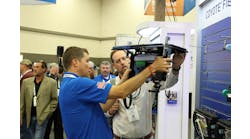Latest from Professional Development/Leadership
Fujitsu Study Shows Brain Training Improves Tech Worker Efficiency
In a first of its kind study, independent researchers from the Platypus Institute have shown the neurocognitive training program BrainHQ improves cognitive efficiency among tech workers.
The use of a brain training app boosted measures of efficiency among tech workers, according to independent researchers from the Platypus Institute, who presented their findings at the 41st Annual Engineering in Medicine and Biology Conference in Berlin. The brain training app was BrainHQ, which is available to the public from Posit Science as iOS, Android, and web apps.
The researchers found relatively small amounts of BrainHQ training drove significant gains in efficiency, based on standard neuropsychological assessments and brain imaging. In addition, study participants reported qualitative gains from the training.
InvisiLight® Solution for Deploying Fiber
April 2, 2022Go to Market Faster. Speed up Network Deployment
April 2, 2022Episode 10: Fiber Optic Closure Specs Explained…
April 1, 2022Food for Thought from Our 2022 ICT Visionaries
April 1, 2022The researchers recruited 22 technology workers at Fujitsu Labs America to participate in the study. All were measured before and after training on a battery of 8 standard assessments (from the Dana Standard assessment battery) to generate a composite index of cognitive efficiency. Participants also underwent electroencephalographic (EEG) recording of brain activity before and after training (resulting in EEG-derived images), and they filled out self-report surveys of their experiences at work. Twenty-one (21) participants completed the study.
Participants were asked to complete 20 half-hour sessions (a total of 10 hours) of BrainHQ training over the course of 6 weeks; however, some participants did much more training, and some did less.
For analysis purposes, the researchers did split participants into 2 groups: a group that trained more than average and a group that trained less. The "Long Group" completed between 17 and 45 hours (with an average of 30 hours) and the "Short Group" completed between 1 and 14 hours (with an average of 7 hours). This allowed the researchers to measure the effect of the amount of training on results. Before the training, there was no significant difference between the groups in the cognitive assessments, nor in EEG recording.
Researchers found an overall improvement in cognitive efficiency — measuring the speed and accuracy of cognitive performance — of about 8% from the training. And, the data indicated that more training was better, with the Short Group improving by 5% and the Long Group by 12%.
EEG recording showed the brain increasing in efficient operations in a manner that was parallel to what was seen in the neuropsychological testing.
The researchers indicated that qualitative self-reports from participants further confirmed the findings, sharing a quote from a participant who said, "Since I started brain training, I’ve noticed a change in my focus and memory. I recall more details in my work and can sustain a high level of focus for longer."
"This is an important study of the use of our training in the workplace to boost efficiency," said Dr. Henry Mahncke, CEO of Posit Science. "As industry looks for ways to increase productivity — especially in the service sector — they often face diminishing returns from further investment in automation. Yet, this study indicates a relatively modest investment in training workers — to have faster and more accurate brains — could have a huge payoff."
"There are more than 150 peer-reviewed journal articles on the benefits of BrainHQ," Dr. Mahncke noted. "At first, most of those were in healthy aging. Then, many published in different clinical populations with cognitive issues. Then, elite athletes and teams really opened our eyes to what BrainHQ can do for even top performers. These new studies show how having a faster and more accurate brain can make a big difference in things that really matter in the workplace."
The study paper, slides, images and other assets can be found at an online at https://www.brainhq.com/news/tech-workers-study.
A STUDY FOCUSED ON POWER LINE WORKERS
This is the second study published this year on the impact of BrainHQ in the workplace. In April, a study showed that such training could significantly reduce error rates in powerline workers, where a mistake can be fatal. When researchers looked at reportable incidents over a 4-year period after training, those who trained a small amount (just 12 hours at the beginning of the period) were about 9 times less likely to make a reportable error than the untrained control group. (The study focusing on power line workers is Improving Attentiveness: Effect of Cognitive Training on Sustained Attention Measures, and can be found at https://www.onepetro.org/journal-paper/ASSE-19-04-31.
Like this Article?
Subscribe to ISE magazine and start receiving your FREE monthly copy today!
About the Author: Dr. Henry W. Mahncke is a research neuroscientist, who serves as CEO of Posit Science Corporation, a provider of plasticity-based brain training and assessments. At Posit Science, Dr. Mahncke established the company’s global scientific advisory boards and extensive research program. Dr. Mahncke is also the principal investigator of a number of federal research grants (e.g., NIH, DoD), and has led the design, execution, and analysis of a variety of multi-site randomized controlled trials of cognitive training in healthy aging, mental illness, and brain injury. Dr. Mahncke is the author of numerous peer-reviewed articles, frequently presents at conferences and symposia, and has appeared on the Today Show, Inside E Street, and many other television and radio programs. For more information, and a complete biography, please visit https://www.brainhq.com/news/tech-workers-study.








